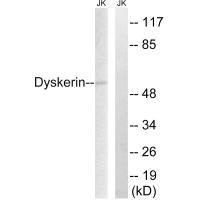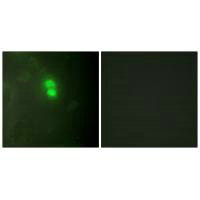DKC1 Antibody
-
货号:CSB-PA820074
-
规格:¥2024
-
图片:
-
其他:
产品详情
-
产品名称:Rabbit anti-Homo sapiens (Human) DKC1 Polyclonal antibody
-
Uniprot No.:O60832
-
基因名:DKC1
-
宿主:Rabbit
-
反应种属:Human,Mouse,Rat
-
免疫原:Synthesized peptide derived from Internal of Human Dyskerin.
-
免疫原种属:Homo sapiens (Human)
-
克隆类型:Polyclonal
-
纯化方式:The antibody was affinity-purified from rabbit antiserum by affinity-chromatography using epitope-specific immunogen.
-
浓度:It differs from different batches. Please contact us to confirm it.
-
产品提供形式:Liquid
-
应用范围:ELISA,WB,IF
-
推荐稀释比:
Application Recommended Dilution WB 1:500-1:3000 IF 1:100-1:500 -
Protocols:
-
储存条件:Upon receipt, store at -20°C or -80°C. Avoid repeated freeze.
-
货期:Basically, we can dispatch the products out in 1-3 working days after receiving your orders. Delivery time maybe differs from different purchasing way or location, please kindly consult your local distributors for specific delivery time.
相关产品
靶点详情
-
功能:Catalytic subunit of H/ACA small nucleolar ribonucleoprotein (H/ACA snoRNP) complex, which catalyzes pseudouridylation of rRNA. This involves the isomerization of uridine such that the ribose is subsequently attached to C5, instead of the normal N1. Each rRNA can contain up to 100 pseudouridine ('psi') residues, which may serve to stabilize the conformation of rRNAs. Required for ribosome biogenesis and telomere maintenance. Also required for correct processing or intranuclear trafficking of TERC, the RNA component of the telomerase reverse transcriptase (TERT) holoenzyme.; Promotes cell to cell and cell to substratum adhesion, increases the cell proliferation rate and leads to cytokeratin hyper-expression.
-
基因功能参考文献:
- The expression of DKC1 was upregulated in ccRCC. PMID: 29901172
- Dyskerin isoform 3 boosts energy metabolism. PMID: 29132127
- dyskerin suppression caused p53-dependent G1 cell-cycle arrest in p53 wild-type cells, and a p53-independent pathway impaired proliferation in cells with p53 dysfunction. PMID: 27197171
- observed dyskerin expression, telomerase RNA accumulation, and pseudouridylation present in all DKC1 mutation carriers at levels comparable to healthy wild-type controls PMID: 27570172
- A mutation in the DC gene 1 (DKC1) at Xq28 results in dysfunction of dyskerin, a protein that is involved in telomere maintenance and ribosomal biogenesis. PMID: 27018886
- Loss of dyskerin binding leads to telomerase RNA component degradation. PMID: 26950371
- Expression of GSE4 increased telomerase activity and reduced DNA damage, oxidative stress and cell senescence in dyskerin-mutated cells. PMID: 26571381
- influence of dyskerin expression on tumor clinical outcome is linked to its role on the maintenance of high levels of TERC PMID: 26301749
- a significant increase in DKC1, RAD50, MRE11 and RPA1 expression in MM cases with high bone marrow infiltration (p
- Performed a comprehensive study of human dyskerin through structural, phylogenetic and bioinformatic analysis. PMID: 25540932
- DC is genetically heterogeneous. X-linked DC is the commonest form of the disease, accounting for approximately 30% of cases, and is caused by mutations of the DKC1 gene encoding the dyskerin protein. PMID: 25499969
- The non-neoplastic biliary tree seems to progressively lose dyskerin expression from the major branches to the peripheral portal bile ducts. Similarly, intrahepatic cholangiocarcinomas showed two patterns of dyskerin expression PMID: 25367684
- DKC1 mutations were found in Indian patients with aplastic anemia. PMID: 25906515
- dyskerin is a highly dynamic protein throughout the cell cycle and increases the repertoire of fundamental cellular processes that are disrupted by absence of its normal function. PMID: 24303026
- DKC1 variant represents the third telomere-related gene identified as a genetic cause of FIP. PMID: 24504062
- whole-exome sequencing for the genetic diagnosis of this patient with possible Hoyeraal-Hreidarsson syndrome and successfully identified a missense mutation (c.146C>T, p.Thr49Me) in DKC1. PMID: 24914498
- Using human U2OS osteosarcoma cells, the study shows that siRNA-mediated dyskerin depletion induced cellular senescence as evidenced by proliferative arrest, senescence-associated heterochromatinization and a senescence-associated molecular profile. PMID: 24690175
- 3 novel alternative splice isoforms of DKC1 derived from human X-linked dyskeratosis congenita 1 have been identified. PMID: 24219293
- that females with heterozygous DKC1 mutations may be at increased risk for developing penetrant telomere phenotypes that, at times, may be associated with clinical morbidity. PMID: 23946118
- Results show that dyskerin stability is regulated by SUMOylation and that mutations altering dyskerin SUMOylation can lead to defects in telomere maintenance that are characteristics of dyskeratosis congenita. PMID: 23660516
- Direct DKC1 gene mutations were not a frequent event in human lung, breast or colon tumourigenesis. PMID: 23348390
- We describe an African American family with Hoyeraal-Hreidarrson syndrome (HHS) in which 2 TERT mutations (causing P530L and A880T amino acid changes) and two in the DKC1 variants (G486R and A487A) were segregating. PMID: 23335200
- Dyskerin overexpression in human hepatocellular carcinoma is associated with advanced clinical stage and poor patient prognosis. PMID: 22912812
- SMUG1 is a DKC1 interaction partner that contributes to rRNA quality control, partly by regulating 5-hydroxymethyluridine levels. PMID: 23246433
- Two novel mutations (p.His68Arg and p.Lys390del) have been found in DKC1 genes of Spanish patients with dyskeratosis congenita. PMID: 22664374
- purified telomerase holoenzyme complexes from different X-linked dyskeratosis congenita (X-DC) cells have normal catalytic activity; data confirm that dyskerin promotes telomerase RNA (TER) stability in vivo, endorsing the development of TER supplementation strategies for the treatment of X-DC PMID: 22058290
- suggests that DKC1 nucleolar and cytoplasmic functions might cumulatively account for the plethora of manifestations displayed by this syndrome PMID: 21820037
- rRNA pseudouridylation defects resulted from a deficient pseudouridylate synthetase affect ribosomal ligand binding and translational fidelity from yeast to human cells. PMID: 22099312
- A genetic analysis was performed and a new missense mutation S356P, hemizygous, was identified in the DKC1 gene in two dyskeratosis congenita patients. PMID: 21736606
- The role of dyskerin in tumorigenesis does not correlate with its function within the telomerase complex. Dyskerin is often overexpressed in oral squamous cell carcinoma, and correlates with active cell proliferation. PMID: 21674675
- a recurrent mutation c.1058 C>T (p. A353V) in the DKC1 responsible for dyskeratosis congenita in a Chinese family was identified. PMID: 21601430
- intact dyskerin levels, in the absence of coding mutations, are critical for telomerase RNA stability and for in vivo telomere maintenance. PMID: 21415081
- Data reinforce the notion that loss and gain of dyskerin function may play important roles in tumorigenesis. PMID: 21480387
- Bisulfite sequencing revealed that only FancB and DKC1 showed no methylation in normal patients, yet the presence of promoter hypermethylation in HNSCC patients. PMID: 20332657
- Effects of dyskeratosis congenita mutations in dyskerin on assembly of H/ACA pre-RNPs PMID: 20008900
- Impairment of dyskerin function causes p53 inactivation due to a defect in p53 mRNA translation. Reduction of dyskerin causes a decrease of p53 mRNA translation and protein levels in human breast cancer cells and mammary epithelial progenitor cells. PMID: 20501855
- Analyzed was genomic DNA isolated from peripheral lymphocytes of 17 individuals affected with dyskeratosis congenita. Two novel mutations were discovered. PMID: 19879169
- Impaired interaction between NAP57 and SHQ1 is a molecular basis for dyskeratosis congenita. PMID: 19734544
- TEP1, hTR, hsp90, p23, and dyskerin remained at high and unchanged levels throughout up- or down regulation of telomerase activity. PMID: 12135483
- the human TruB family includes at least three members: DKC1 (previously identified), TRUB1 and TRUB2. PMID: 12736709
- Review. DKC1 encodes dyskerin, a protein component of small nucleolar ribonucleoprotein particles. Dyskerin & TERC closely associate with each other in the telomerase complex. DKC1 deficiency causes X-linked dyskeratosis congenita. PMID: 15613268
- specific defect in IRES (internal ribosome entry site)-dependent translation in X-linked dyskeratosis congenita cells; defect results in impaired translation of mRNAs containing IRES elements, including those encoding p27Kip1), Bcl-xL and XIAP PMID: 16690864
- protein composition of catalytically active telomerase; mass spectrometric sequencing of the components & molecular size determination indicate an enzyme composition of two molecules each of telomerase reverse transcriptase, telomerase RNA & dyskerin PMID: 17395830
- THe first case of X-linked DC in Malaysia and a novel mutation in the DKC1 gene are described. PMID: 17417794
- mutations in the telomerase complex and their connections with dyskeratosis congenita and bone marrow failures [review] PMID: 17625368
- These data indicate that DKC1 is a direct and conserved transcriptional target of c-MYC, and suggest a biologic basis for DKC1 overexpression in neoplasia. PMID: 17822678
- These data demonstrate that this domain of dyskerin plays an important role in telomerase maintenance following cell insults such as cisplatin treatment, and in telomerase-defective cells in patients with X-linked dyskeratosis congenita. PMID: 18057229
- Significantly higher DKC1 mRNA is associated with colorectal cancer. PMID: 18607840
- An intronic splice site mutation in DKC1 was found in an infant with Hoyeraal-Hreidarsson syndrome. PMID: 18627054
- a 2 bp inversion in exon 3: NM_001363:c.166_167invCT (Leu56Ser) mutation in DKC1 in dyskeratosis congenita identified in a Russian family PMID: 18802941
显示更多
收起更多
-
相关疾病:Dyskeratosis congenita, X-linked (DKCX); Hoyeraal-Hreidarsson syndrome (HHS)
-
亚细胞定位:[Isoform 1]: Nucleus, nucleolus. Nucleus, Cajal body.; [Isoform 3]: Cytoplasm.
-
蛋白家族:Pseudouridine synthase TruB family
-
组织特异性:Ubiquitously expressed.
-
数据库链接:
HGNC: 2890
OMIM: 300126
KEGG: hsa:1736
STRING: 9606.ENSP00000358563
UniGene: Hs.4747
Most popular with customers
-
-
YWHAB Recombinant Monoclonal Antibody
Applications: ELISA, WB, IF, FC
Species Reactivity: Human, Mouse, Rat
-
Phospho-YAP1 (S127) Recombinant Monoclonal Antibody
Applications: ELISA, WB, IHC
Species Reactivity: Human
-
-
-
-
-






















